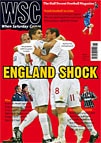 Scotland's 2010 World Cup qualifying campaign was a painful experience both on and off the pitch. But Neil Forsyth refuses to be downhearted
Scotland's 2010 World Cup qualifying campaign was a painful experience both on and off the pitch. But Neil Forsyth refuses to be downhearted
Onwards Scotland march. Another major tournament without involvement, despite being in arguably the easiest qualifying group, with senior players picking up a sine die ban for an all-night bender, a manager still trying to convince the public of his suitability and an SFA leadership who increasingly resemble the committee of a provincial bowling club.
It was a campaign that started badly and got worse before managing a recovery of sorts when it was all too late. A decent second half against Macedonia and a highly impressive, though losing, performance against a Dutch side who had already qualified for the World Cup was enough to save George Burley’s job but that’s about it. It won’t do much to convince anyone that qualification for the 2012 European Championship is going to be anything other than another steep task. It’s going to be a long year until Scotland’s next competitive match.
The Dutch game was hard to watch for many reasons. The determination of the players to outdo each other with the artistry in which they could miss scoring opportunities was tough going. What hurt more was that, putting the ball in the net aside, Scotland showed they have players that can compete comfortably at that level. Darren Fletcher, Scott Brown and Alan Hutton are the obvious standouts but collectively, when fit, Scotland can field a fluid, youthful team that should be capable of much more.
It is only because he managed that late display of marshalling his players into an effective unit that George Burley is still in charge. There’s no doubt that defeats to both Macedonia and Holland would have led to him being sacked in his much-publicised Hampden summit, but the team’s performances saw the SFA announcing he would be the man for 2012. In truth, there was another factor. The SFA leadership, finding themselves under considerable fire, were politically keen to repackage Burley’s eight-match campaign as holding hope for the future. It was a tough sell, and it didn’t really work, but many would pragmatically ask who would come in for Burley if he was to go.
Gordon Strachan’s chippiness would be a risk for international management, both in answering to committee and dealing with large-scale press interest, while Gary McAllister suffered the indignity of being offered, and declining, the number three coaching position despite being interviewed at the time as a rival to Burley.
David Moyes wouldn’t take it and the SFA couldn’t afford him anyway while a foreign coach is still unlikely after the disastrous Bertie Vogts era. Craig Levein is probably the best Scottish manager working in Scotland but he is known to have a difficult relationship with SFA chief executive Gordon Smith who Levein claims has not forgiven him for releasing Smith’s son Grant at Dundee Utd.
Smith and SFA president George Peat have not been looking any more convincing than Burley, both managing to make the SFA seem smaller every time they open their mouths. Smith is a committed follower of the populist move – speaking out over Eduardo’s dive in the Champions League for example – that should be well below the office of an FA chief executive.
It was surprising that the SFA president gave an interview before the Macedonia and Holland games and that’s before you consider his specific flagging of a miss by Chris Iwelumo against Norway as a reminder of things that had gone wrong. Burley broke ranks to publicly criticise Peat, who was quick to apologise to the manager and players. There is no doubt that if Burley had gone many would have asked why that was the end of the departures from Hampden.
Even though their decision to keep Burley may have been partially self-regarding, there is the possibility that the SFA’s decision could be vindicated. The Barry Ferguson-led “Boozegate” can be left behind with the World Cup campaign and the result is a younger, more mobile midfield and a manager who, albeit gradually, built up his authority from a shaky start. Either way, it’s another long wait for any form of Scottish success but all is not lost. Maybe Andy Murray will win Wimbledon. And that Susan Boyle’s doing very well for herself.
From WSC 273 November 2009